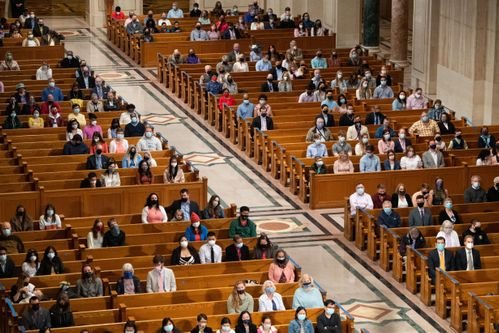Your guide to avoiding Covid-19 at church and other religious services

If you’re wondering how to get back to in-person religious services, CNN Medical Analyst Dr. Leana Wen recommends thinking about it like your finances.
Just like a financial budget helps you figure out what your spending limits are, a “coronavirus budget” can help you figure out where your boundaries are in terms of potentially risky activities — including religious services, she said.
“If going to church is the most important thing and, unfortunately, people at church are of unknown vaccination status (and) all close together without masks, somebody who is unvaccinated could still decide ‘That is the most important thing to me, so I’m going to continue doing this one activity,'” said Wen, an emergency physician and visiting professor of health policy and management at the George Washington University Milken Institute School of Public Health. “‘But I’m not also going to go to an indoor restaurant.'”
Fully vaccinated people don’t need to wear masks or physically distance unless they’re on public transportation or required to by local laws, places or businesses, the US Centers for Disease Control and Prevention announced May 13. Fully vaccinated people who are immunocompromised — or living with people who are immunocompromised — should still behave cautiously, since immune-weakening conditions make someone at higher risk for serious disease and death if they get Covid-19.
Some churches, synagogues, mosques and other houses of worship have been offering virtual or outdoor services.
At in-person services inside, both vaccinated and unvaccinated people should “follow local public health measures as well as the rules put in place by the individual houses of worship. These may vary so it will be important to check before attending a service,” said Dr. Ada Stewart, a family physician with Cooperative Health in Columbia, South Carolina, and the president of the American Academy of Family Physicians.
That includes following the guidance of your local public health department or government. Wear a mask, stay at least 6 feet away from people who don’t live in your household, and avoid poorly ventilated spaces. Well-ventilated spaces have the ability to open windows and doors and use window fans. They also have properly operating ventilation systems and HEPA (high-efficiency particulate air) filtration systems that enhance air cleaning.
Try to sit near an open window or door, or choose a service in which people tend to sing less, Wen said. Singing can require making your voice louder and more forceful, which would increase the risk of spreading coronavirus through the air. Before and after the service, wash your hands with soap and warm water for at least 20 seconds, or use hand sanitizer.
Ask your house of worship if it’s regularly cleaning, with soap or detergent, frequently touched surfaces like pews, pens or offering plates. You could bring sanitizing wipes to use if needed. The risk of getting infected with coronavirus by touching contaminated surfaces is generally low, the CDC has said. But it depends on several factors, including the infection rate in your community. The likelihood of surface transmission can be further reduced by properly wearing masks and handwashing.
The CDC has recommended a few steps to reduce the potential risk involved with sharing materials: Avoid or limit use of shared objects such as pens, hymnals, religious texts, bulletins or other worship aids. Ask whether your church can instead photocopy or electronically display or project prayers, songs and texts.
Houses of worship can also use stationary collection boxes for offerings instead of passing a basket, or accept contributions online. If food is offered at or after services, choose pre-packaged foods instead of buffet or potluck meals, if possible.
If you have children, the CDC has also provided resources for preventing the spread of coronavirus in child care settings. Whether children should attend Sunday school depends on the setting, Wen said.
For unvaccinated children older than 2, “there should be enforced masking at all times, ideally (6-feet) distancing,” she said.
“Outside is much better than inside,” Wen added. “If it’s inside, at least have it be in a well-ventilated space. We should consider Sunday school to be the same as regular school, which is that transmission can be quite low if the proper mitigation measures are followed.”



